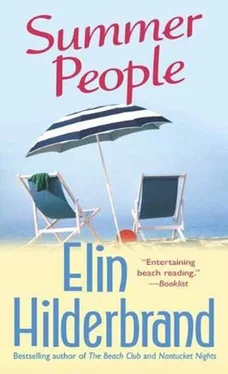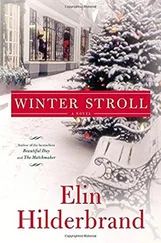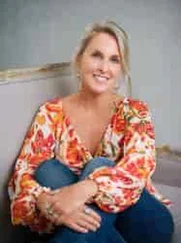“I had mixed feelings,” Beth said. “But you hear about cold feet all the time-a bride and groom are supposed to have cold feet. And I loved David. I was twenty-one years old. If I’d wanted to back out, I would have.”

When she emerged from the tiny bathroom in her white dress and rope sandals with the cork heels, David fell back on the sofa with his hand over his heart. “You look so beautiful you scare me,” he said. “God, Beth…” His eyes filled and Beth felt a swell of pride. This was exactly the kind of reaction she wanted from her husband on her wedding day. She wanted to bowl David over; she wanted to bring him to tears. Beth was pleased with how she looked-young and blond and very tan. The dress, while not a wedding dress, was perfect for a girl like her on a summer day. Her spirits lifted.
David drove into town but had trouble finding a parking space. It was overcast, and the town was filled with people lunching and shopping. Beth remembered being terrified that her mother would see her, or a friend of her mother’s. She squeezed the purple cosmos; they left gold dust all over her hands, and she had to wash up in the public restroom of the Town Building before the ceremony.
The wedding itself was unremarkable. A judge wearing Bermuda shorts married them in a room without windows. The room was empty except for a conference table and three folding chairs. The judge stood on the far side of the table, looking not so much like a judge as one of Beth’s father’s golf partners. Two male law students who were working in the probate court for the summer were brought in to witness, along with a secretary from the selectmen’s office. Those three strangers sat next to Beth and David in the folding chairs. The law students were just kids not much older than Beth and David, and they looked put upon for being asked to watch for ten minutes in the name of legality. The secretary was older, with kids of her own probably. She dabbed her eyes with a tissue as Beth and David said their vows. Before Beth knew it, it was over. She signed the marriage certificate, the judge in the Bermuda shorts kissed her cheek and said, “Congratulations, Mrs. Ronan.” He left shortly thereafter to meet his wife at the Yacht Club.
David and Beth went for lunch at the Mad Hatter, a place they went when David got a cash bonus for a painting job or when Beth’s father slipped her extra spending money before returning to New Jersey.
Their table, Beth noticed right away, had a centerpiece of purple cosmos, and there was a bottle of Taittinger chilling on ice. For reasons beyond her understanding, these details, arranged by David ahead of time, made her heart sink. He was trying so hard and yet it didn’t seem like enough. That was what Beth thought as she sat down. The two of them, alone for their wedding reception, didn’t seem like enough.
Beth drank nearly the whole bottle of champagne herself. Throughout lunch, David talked nonstop about plans: getting her things moved into the cottage, her finding a job, the fall and winter on Nantucket, a vacation in March-a belated honeymoon-to Hawaii or Palm Beach. Kids. (Kids! At the mention of kids, Beth laughed. She was a kid herself.) Beth ate a plate of fried calamari, then a lobster roll, then a hot fudge sundae since the restaurant didn’t have cake. A glob of hot fudge sauce hit the front of her white dress and she blotted it with a wet napkin, but to no avail. There was a spot; she was sullied. She reached for the champagne bottle, and finding it empty, waved their waiter over and ordered a gin and tonic. She felt David watching her. When she met his eyes, she saw so much love there it frightened her. She urged him to get the bill while she bolted her drink. When it was time to go, she had to grab onto the table in order to stand up. The ring irritated her finger. David led her out to the car, and when they got home they made love. Beth fell asleep before the sun even set.
In the morning, David left for work. It was lying in bed, alone and dreadfully hungover, that Beth confronted the gravity of what she had done. She had eloped with David. She went into the bathroom and looked in the mirror, which was still foggy from David’s shower, and she held her hand up alongside her face. The ring told the truth: she was a married woman. She took three aspirin then went to the kitchen for coffee and found the bouquet of purple cosmos limp and wilting on the counter. It was enough to bring tears to her eyes, but she didn’t cry. She was too scared to cry-scared because she was going to have to tell her parents.
She got dressed in the same shorts and T-shirt she had left the house in two days earlier and drove home. Never had Horizon seemed so imposing. Beth understood as she walked into the house that her parents might be angry enough to disown her and ban her from both Horizon and their home in New Jersey forever.
Beth found her mother sitting at the kitchen table-the very same table where Beth sat with Garrett and Winnie now-smoking a cigarette and drinking coffee, sick with worry because Beth had spent two nights away from home.
“You’ve been with David, haven’t you?” her mother said.
Beth nodded and then held out her hand to show her mother her wedding ring and her mother dropped her cigarette on the floor and cried out, “You’ve gone and done it! Oh, dear child, I have to call your father!” Beth’s mother flew out the front door in her housecoat, and drove their woody wagon to town where she could use the telephone. Beth picked the cigarette up off the floor-it left a burn mark, which she pointed out now to Garrett and Winnie-then went upstairs and packed her things and left the house, in her mind, for the final time.

A few days later, Beth had a job as a teller at Pacific National Bank, a bank where her parents, pointedly, did not have an account. Her hours were similar to David’s and they resumed the rhythm of their summer. Swimming, sailing, dancing at the Chicken Box. David called her “Mrs. Ronan.” Beth scanned the streets for her parents before she stepped outside. She expected her father to show up on their doorstep any second, but he never came. This made Beth feel even worse. Her father was finished with her. She began to worry that she would never see either of her parents again.
What Beth remembered most about the two weeks that she and David were married was that David was so happy. Seeing him so happy made Beth realize that she wasn’t as happy as he was. In fact, she was miserable. As she took deposits and cashed checks at the bank, she thought longingly of returning to Sarah Lawrence. She’d already registered for courses-courses she knew David would find elitist and useless: Discourses on Gender and Ethnicity, History of the American Musical Theater, The Literature of the Lost Generation, Etruscan Art. Beth wanted to finish college and then move to Manhattan and get a real job in publishing or advertising. She didn’t want to be a bank teller living in a rented cottage on Bear Street, estranged from her parents who had provided her with every possible advantage in life. One evening at dinner, which Beth now felt a wifely responsibility to prepare, she broached the topic of returning to Sarah Lawrence.
“I won’t live apart for another winter,” David said.
She took his hand; his wedding ring was already flecked with paint. “You can come with me,” she said.
“To New York ?” As if she had suggested Mongolia, or the moon.
“You’ll like it.”
He withdrew his hand. “There’s no way I’m leaving the island. I have a job here. I want to save money for our future.”
Читать дальше














